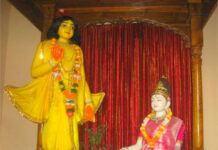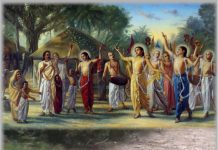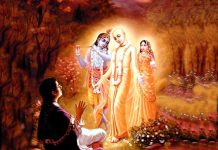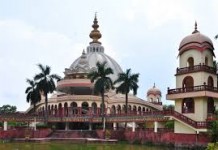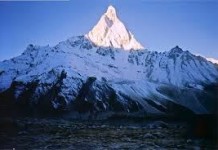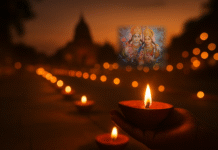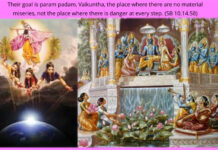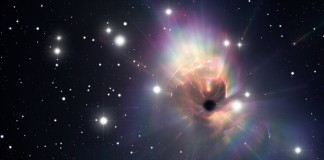We normally imagine time as a line that started at some point and stretches indefinitely. This affects even our language, with words such as “timeline”. All different historical events, such as the battle of Kuruksetra, the advent of kali-yuga the construction of the pyramids, the collapse of the Roman empire, dark ages, the Enlightenment, industrial revolution, and so on can be represented in chronological order in such a timeline.
Some think that this line started with the big bang, others with Adam and Eve, but most will agree that, at most, everything started a few billion years ago, if not less. The Vedas, the classic literature of ancient India, brings however a very intriguing explanation about time, that may really surprise you. Are you ready?
From the Srimad Bhagavatam, Brihad Bhagavatamrita and other books that describe the creation and the flow of time in the universe, we get the information that time works not like a line, but as a circle. Yes, a circle. There is a finite (albeit almost unlimited) amount of events, and they repeat cyclically. There are different cycles that affect different levels of planetary systems, but they all repeat.
First of them is a divya-yuga (or chatur-yuga), that affects our planet. This cycle lasts for 4.32 million years, and is divided into 4 yugas. At the end of the cycle there is a partial devastation, and everything starts again. We are in the last one, kali-yuga, but don’t worry, it’s still going to last for 427.000 years.
Next, there is a manvantara, that affects the inhabitants of higher planetary systems. A manvantara is composed of 71 divya-yugas, in a total of 306.72 million years, plus a period of transition called sandhya.
Then, there is a kalpa, a cycle of creation, that is composed of 14 manvantaras, and lasts for 4.32 billion years. At the end of a kalpa the planets of the universe are completely destroyed, and only the material elements remain. There is then an equally long period of darkness, and finally the cycle of creation and destruction repeats.
The kalpa cycles correspond to the days and nights of Lord Brahma, the universal architect. Although very powerful, Brahma is a living being, just like you and me. However, due to his great qualification, he receives the responsibility of administering the universe, like a minister. Did it ever pass through your mind that the universe may not have been created by chance? Well, in fact it was not.
Lord Brahma lives for an extremely long period of time, 311.04 trillion years to be precise. It may sound mind boggling, but his body is composed of pure intelligence, therefore it doesn’t age like ours. All the inhabitants of his planet have similar bodies and live for equally long periods of time. If you so desire, it’s possible to go there.
However, even Lord Brahma eventually dies. With his death, the universe is completely destroyed, but after an equally long period it’s created again by Maha-Vishnu and the cycle repeats. These cycles are going on for eons.
Great sages are capable of connecting with this eternal time, and thus they can see everything that happens in the cycle. This explains how they can see the future. It’s just like someone who sees a movie and can tell how it ends. Because they see that the material sphere consists of just repetitions of the same events, they soon get bored and decide to leave, moving to the transcendental realm.
There are many universes that are in different points of these cycles. In some of these universes there may be another you… Well, not exactly you, but someone exactly like you, living in a very similar situation. Each soul transmigrates to different bodies in different universes, each time taking birth in a situation according to his previous desires and activities. It’s like going to a cinema, where you can choose which movie to watch, and then another one, and another one, and another one, until you get bored and decide to go home.
When a soul is tired of transmigrating in the material sphere, he eventually becomes a transcendentalist and starts seeking liberation, to attain the transcendental realm, where there is eternity and bliss.
Time in the transcendental realm is radically different. There, time is not like a circle, but like a net. Yes, it may sound really far out, but stay with me. In his Jaiva Dharma, Srila Bhaktivinod Thakur summarizes the conclusions of different books in the Vedic Philosophy, explaining that in the transcendental realm there is no past or future, only present, that doesn’t have a beginning or end. There is an infinite amount of events and all of them happen simultaneously and eternally. One just moves from one event to the other due to the influence of the internal potency, or according to his meditation.
All these events are centered around Lord Krishna, the Supreme Person and the most talented artist. Just like an artist may play different roles, with different dresses and scenery, Krishna manifests Himself in different forms, and in different planets in the spiritual realm. Some of them look like very opulent, divine cities, where everyone is beautiful and live in great bliss, without any anxiety. Some look like earthly kingdoms, where there is a lot of drama and adventure. In others, there is a lot of singing, dancing and ecstasy. There is one planet, where people live like cowherds in a beautiful village, and cultivate the most deep and blissful relationships, with his friend, son or lover: Krishna.
Some think that the transcendental realm is just like an empty garden, where there is nothing to do. Well, the Vedas offer something much more exciting. Want to go there?


